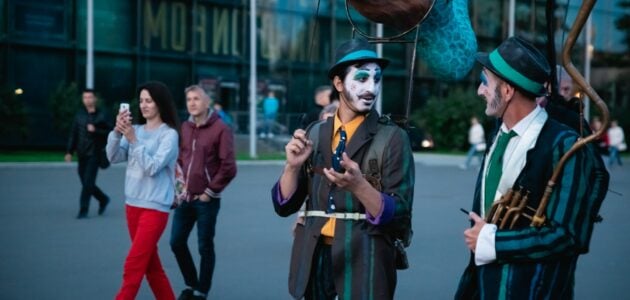
How to Act Comedy
A lot of people think they know how to act comedy, and when you see them on stage you realise they don’t. I really hope I’m not one of them. Acting comedy well is really, really hard. That’s not to suggest it takes effort. In fact, it’s more likely to be the opposite. Great comedy actors say that true hilarity is found in relaxation. So sit back, relax, and let’s explore how to act comedy.
Acting comedy is all about timing. Understanding the punctuation and intention of the lines is absolutely essential. Being confident to make big choices that might seem out of the ordinary but are fully grounded in the text and the characters, is the genesis of all comedic acting.
How to Perform Comedy
To perform comedy well, the process starts with script analysis. Regardless of whether its a play, a film or a TV show you have to have a deep understanding of the given circumstances of the text. You have to understand the text, in order to understand what is making something funny. People have different senses of comedy, and sometimes the writers’ and your own will differ wildly. Getting deep into the given circumstances will help you find what is making a particular moment entertaining and help bring it to life.
We have written a lot on script analysis, a couple of helpful places to start are how to break down a script and the Stanislavski method. There is a general conception that acting in comedy is easier than drama, and this couldn’t be further from the truth. Both require hard work and dedication. Just in different ways.
Once you have thoroughly examined the script, it’s time to look at your character specifically.
What Type of Comedic Character Are You?
Now you have done your script analysis you are ready to figure out where your character sits in the larger story. Generally speaking there are four main types of comedic character. Protagonist, Antagonist, Straight Man and Fall guy – classically it is the interplay between these four types that creates comedic moments. Importantly, characters can shift between these roles depending on the production, sometimes in TV, even the episode! However, the framework for these archetypes has been around since the ancient Greeks and knowing it will help you a lot! I will list them below to give you an idea of what I am talking about.
Protagonist: The Protagonist is the key person in the narrative who we sympathize with and generally speaking, whose story we follow. They do stuff. They move the story forward and drive the action. Examples: Homer (Simpsons), Vyvian (The Young Ones), Fry (Futurama), Jerry (Seinfeld)
Antagonist: Creates the drama, generally by creating conflict with the protagonist or generally causing trouble. They bounce off the Protagonist and are often larger than life. Examples: Bart (The Simpsons), Rik (The Young Ones), Bender (Futurama), George (Seinfeld)
Straight Man: The straight man is the audience’s comparison to reality. Someone normal who sits between the antagonist and the protagonist to give a reference point to normal behaviour. Or at least relatively normal. Examples: Marge/Lisa (The Simpsons), Mike (The Young Ones), Hermes (Futurama), Elaine (Seinfeld)
Fall Guy: The Fall Guy is the slapstick idiot who takes all the hits. If the character is falling down a lot, being hit with wooden planks or generally being the butt of everyone else’s jokes, you are looking at a fall guy. Homer/Bart (Simpsons), Neil (The Young Ones), Zoidberg (Futurama), Kramer (Seinfeld).
It is really important to know which of these character archetypes your character fits into in any given script as they come with distinct performance sizes and features. If you are going for the role of a straight man, you need to be a lot smaller and more deadpan in performance, giving the audience a reference point for them in that situation. The fall guy, by contrast needs to have excellent physical comedy skills and as you can see with that list of characters, they can afford to make big over the top choices, so long as they fully commit to them! Take Kramer opening Jerry’s door in Seinfeld. I mean… He really goes for that right? That is what we need from our fall guys, big choices and commitment to the bit at every stage.
Now you know the story, you know the archetype or at least how your character reacts to the other characters on stage or screen your ready to think about brining the comedy to life.
Visual Comedy Tips
Another important element to consider when acting comedy is how visual comedy works. Now you could listen to me here or you could listen to the absolute genius that is Rowan Atkinson!
The key takeaways here are as follows. Watch for things disappearing or appearing in a script. The faster this happens the funnier it will be. The things we laugh at are closely related to the things that frighten us, objects coming to life, things that appear unexpectedly or in unexpected places can be funny or frightening depending on execution. Jump scares live in similar place in our brains to surreal delightful comedy. Also, stripping people of normal human dignity, pranks, banter and the rest is entertaining and is often the domain of the antagonist in a script.
Imitation and parody are a whole other ballgame. One person imitating another is funny once exaggerated, it becomes parody and even funnier. If the person being imitated is a person of authority, it becomes satire and that is funny in itself. The mechanics of how the parody is achieved can be funny too, zooming out and seeing Rowan on the ironing board in the above video is a perfect example.
“For the comedian nothing transcends character” – Charlie Chaplain.
For the physical comedian this means nothing transcends his body language, getting confident with mime and gesture takes practice and commitment. When executed at a high level, it is utterly hilarious. When it comes to physical comedy and building a gag, there is only one person to look at. Buster Keaton.
There is skill in every pratt fall, every well timed joke, every piece of gestural physicality that might amke
Know Everything
Now you know comedy, you must know the text back to front. Know your lines inside out, and know the other characters even better. Understand their motivations. Know what makes every single character tick. Know their strengths and weaknesses. When other actors talk about their characters in rehearsal, don’t switch off, listen. Listen for anything that you can use to create a moment of unexpected juiciness. These little moments of magic from the rehearsal room are what makes each production unique. Knowing everything about the play you’re in will give you the confidence to play on stage. A play is a huge part of acting comedy.
Vitally, you have to have fun here too. Once you have done that script analysis, learnt the pants out of your lines and worked with the director or a friend on the performance its self, letting go and having a great time is so important. Follow those impulses (safetly!) and react in the moment. Remember that depending on the type of character you are playing, there may be no limit on the size of performance you could give or the choices you could make!
Relax on Stage
There are three things that will help every actor relax on stage: Breath, the script, and the people. For a more in-depth look on relaxation check out this page.
Breath is the key to a relaxed performance. Breathing naturally will allow you to respond naturally. We breathe while we listen and our breath is our first response to new information. We support our thoughts with breath. When an actor holds their breath because of performance anxiety or nerves, the audience picks up that energy. When an actor breathes calmly and responds naturally, the audience feel secure in their seats and the story. Relaxing on stage isn’t about feeling sleepy, it’s about not allowing your nerves to get in the way of your character and the story.

Having faith in the script is essential to relaxing on stage. Read every play before you audition and make sure you believe in the story. If you lose faith in the script during rehearsals, find one element of the story that needs to be told and focus on that. If a play was funny before you start rehearsals, and then loses it, you only have yourself to blame.
Trusting the people involved in a production will definitely help you relax on stage. Imagine a window washer trying to relax if they didn’t trust the guy holding the rope. When you’re acting in a comedy it’s even more important to trust your cast mates and director than in drama. Setting up jokes and paying them off is impossible without trust. Share a meal or a few drinks with your cast mates to help gain their trust, because without it you’re stuffed.
React
“Acting is reacting” Stella Adler
Never has this statement been more true, than in performing comedy. Oh my word. You have to listen and you have to really hear what is being said to you. Knowing how to act comedy isn’t just about knowing how to tell jokes, it’s about knowing how to react. A character’s reaction to an insult or a compliment is often the punchline of a joke. More often that not, the great comedic actor will heighten their reaction to being larger than life for comedic effect. Will Farrell in Anchorman screaming ‘Milk was a bad choice’ is a classic example. Take something minor, make it
Audiences look to see how one character’s lines land on the other characters. These reactions are a physical and/or verbal demonstration of the relationship between the characters in that specific moment. Audiences thrive on these ever changing relationships, they love the hero and hate the villain. So, now that you are reacting to the other characters, try reacting to the audience as well.
Does the villain love to be hated? Does the hero absorb confidence from a supportive audience? Does a slave search for pity in the stalls? Have fun and your audience will too.
Conclusion
So when you are relaxed, in the moment, reacting confidently and playfully – with a great understanding of the given circumstances and character types you are ready to act comedy! From there it’s all about having the confidence in your self to make big choices, grounded in the text that both help tell the story and create some hilarious moments! Good luck! And if you would like to get regular practice working on your acting, check out the Stage Milk Scene Club below!


I don’t know if you are familiar with it but another great source for auditioning is Michael Shurtleff’s book Audition. The short chapter on comedy I found to be particularly good and in line with what you have said in your article.
Thank you for sharing your insight. I read your comments before I begin research for every audition. Just wish I could have met you when I lived in Sydney. Now my daughter is in Melbourne, so who knows? Although I think you are now in L.A. I am now in Phoenix and still performing and theatre is beginning to thrive here.
Again – thanks for being willing to share your experiences.